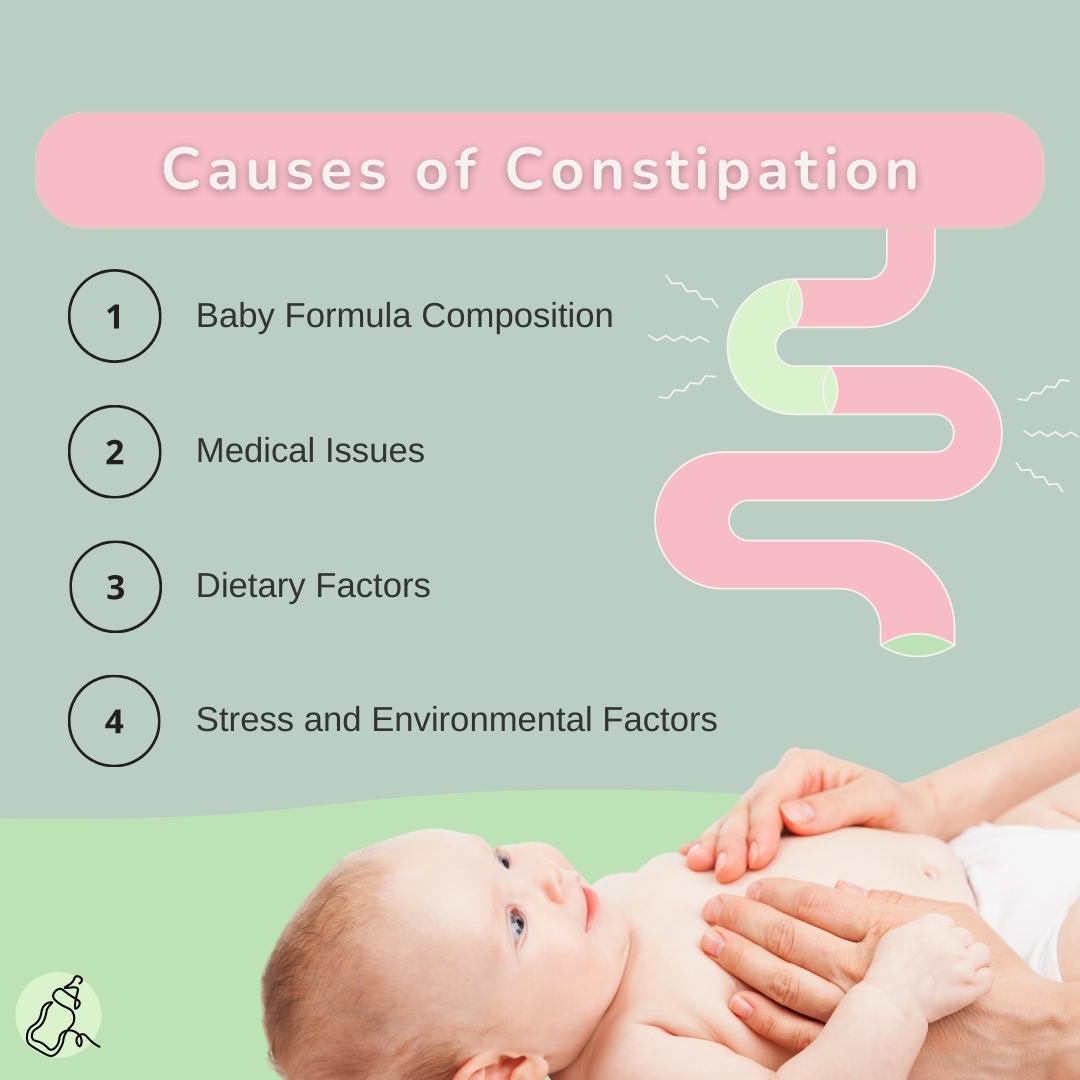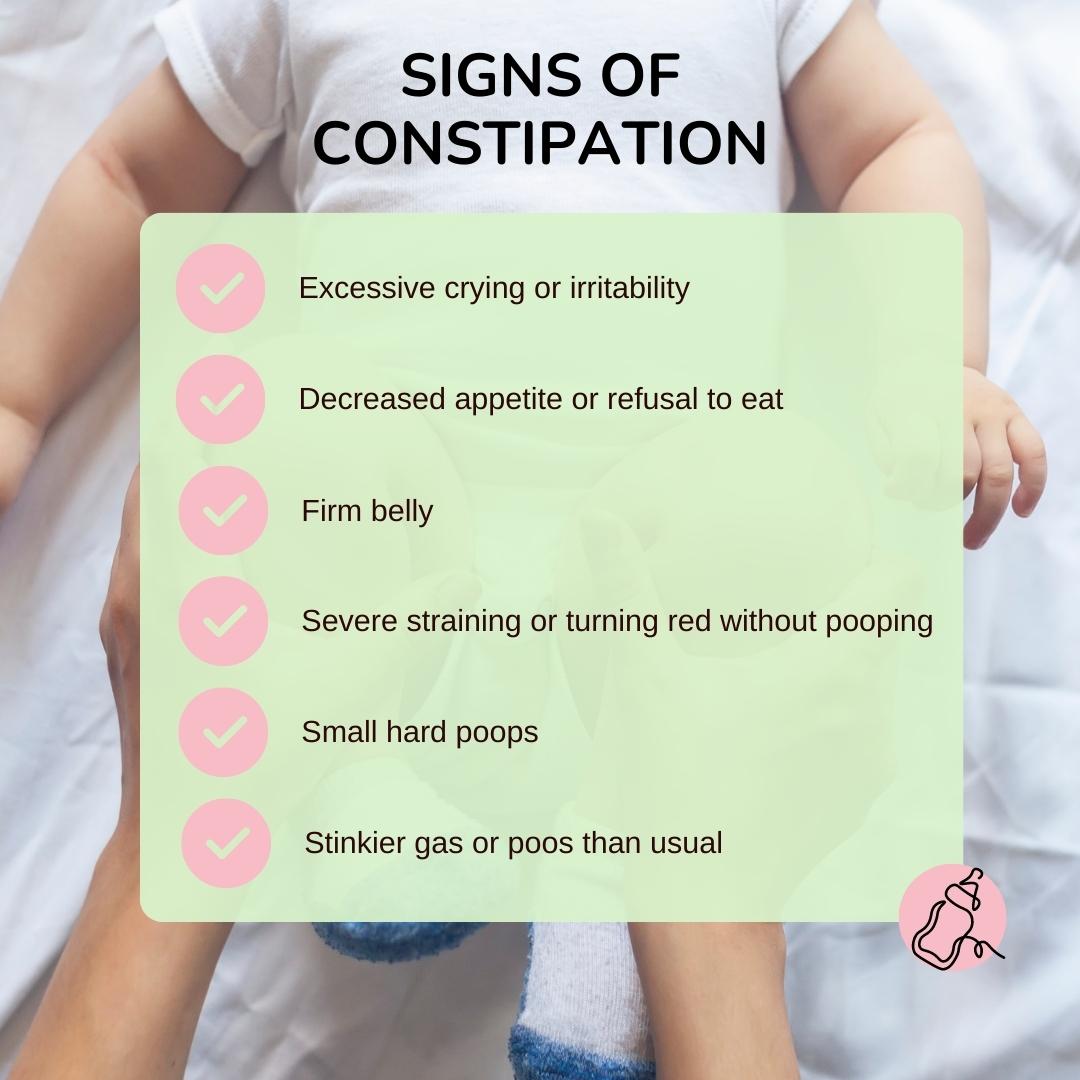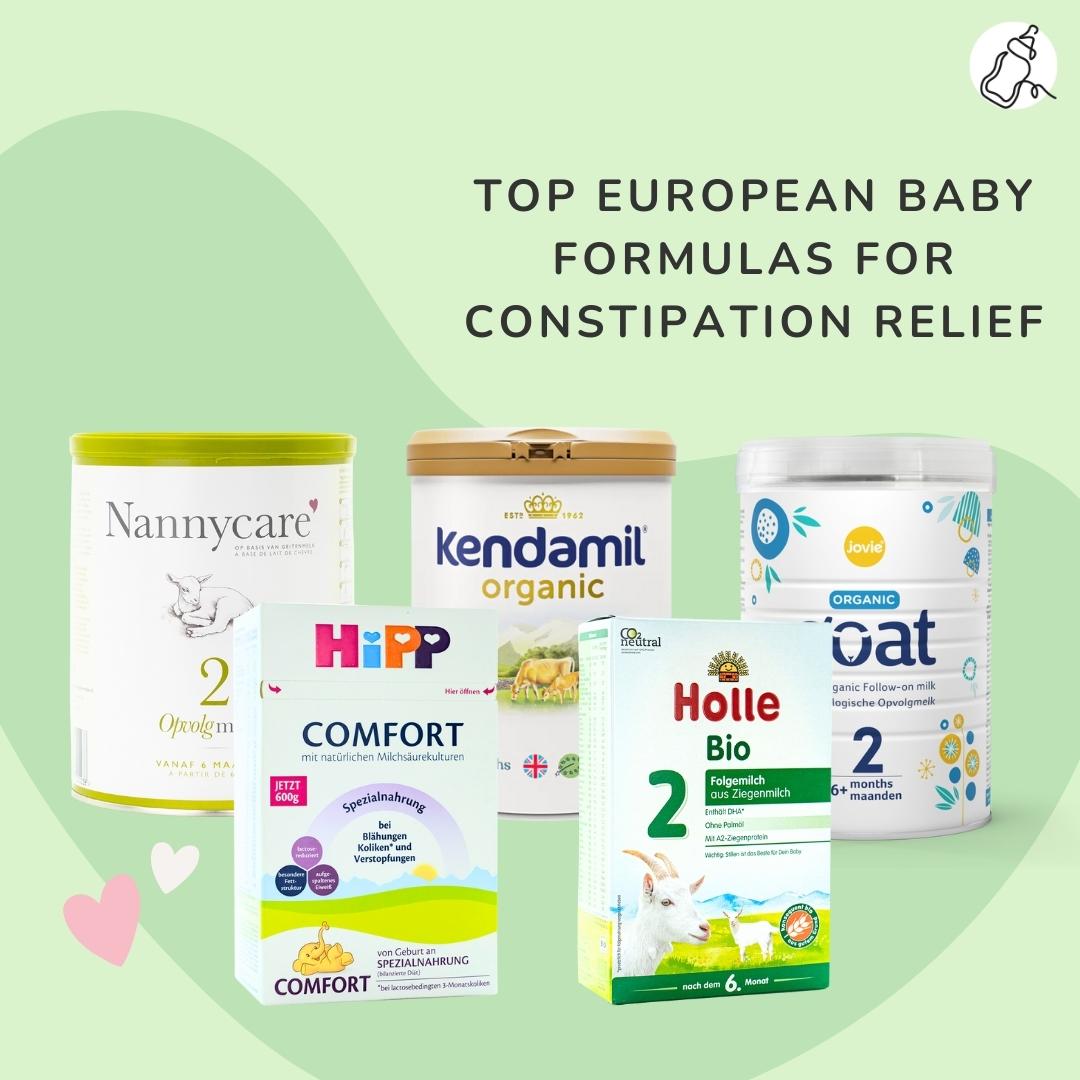Your baby's constipation can appear due to several factors, and infant formula is just one. So, how do you recognize constipation, and what can you do to relieve the symptoms in your little one?
That's what we will cover in today's guide! We'll look at the most common causes of constipation, how to treat it, and how to choose the best formula to help you stop worrying about your baby's digestive health. We will also share our top picks among the best European baby formula options for healthy bowel movements, so let's dive in!
Contents
- Causes of Constipation in Infants: A Brief Overview
- How to Recognize Constipation in Formula-Fed Babies
- Key Ingredients to Look for in the Best Infant Formula for Constipation
- Top European Baby Formulas for Constipation Relief ⭐
- Tips and Recommendations for Relieving Baby Constipation
- When to See a Doctor
- Frequently Asked Questions About the Best Baby Formula for Constipation
Causes of Constipation in Infants: A Brief Overview
To help ease your concerns right off the bat, it's essential to know that constipation is quite common in babies and has a reported frequency of around 30%. Thankfully, medical issues are rarely the root problem representing only a mere 5% of all baby constipation cases.
Familiarizing yourself with the potential causes of constipation in formula-fed babies can help you identify the issue and try to resolve it with your pediatrician's guidance.
So, let's take a look at the factors that can cause irregular bowel movements in your little one:

Dietary Factors 🍽️
Constipation may occur depending on your baby's diet. Irregular bowel movements are possible when switching from breastfeeding to baby formula and when introducing new formula or solid foods.
Your baby may also experience constipation when they don't have enough fiber in their diet. So be sure to add enough fibrous fruits and vegetables when introducing solid foods!
While we're on the topic of solid foods, if your little one has begun weaning, make sure they receive enough age-appropriate liquids between meals. Not drinking enough fluids can also cause constipation. So keep the breast milk or formula flowing!
Stress and Environmental Factors 🌎
Did you know unfamiliar surroundings or stressful events can affect even the youngest babies? Stress can certainly be a culprit of constipation, as babies and children may instinctively delay their bowel movements due to stress. Thus, keeping your little one relaxed when travelling or experiencing life changes is crucial.
Baby Formula Composition 🍼
Interestingly, baby formulas are typically thicker than breast milk. Thus, formula-fed babies may have a harder time digesting their meals than breastfed babies. Plus, unlike infant formula, breast milk is considered a natural laxative which can help move things along in your breastfed baby.
The type of baby formula your little one takes can also impact their digestion. For instance, soy-based formulas and infant formula based on cow's milk protein tend to cause harder bowel movements.
Medical Issues 🏥
Although rare, some medical issues can cause infant constipation. They may include illnesses that cause dehydration, abnormal development of the anus, problems absorbing nutrients, Hirschsprung disease (nerve issues in the colon), spinal cord abnormalities, and certain medicines.
Usually, a doctor can discover these underlying issues by performing a physical examination and collecting information from parents.
How to Recognize Constipation in Formula-Fed Babies
Constipation in babies is not solely determined by irregular bowel movements. It's important to note that just because your baby didn't poop when expected doesn't necessarily mean they are constipated. So, be on the lookout for other signs that may indicate constipation.

Other signs of constipation include:
- Excessive crying or irritability
- Decreased appetite or refusal to eat
- Firm belly
- Severe straining or turning red without pooping (often accompanied by crying)
- Small hard poops (when your baby does poop) that are dry and look like pebbles
- Stinkier gas or poos than usual
It is important to know that constipation in young infants, particularly those under six weeks, could indicate an underlying medical condition. If you observe these symptoms in your newborn, it is crucial to seek immediate medical attention.
Key Ingredients to Look for in the Best Infant Formula for Constipation
If you're seeking the optimal formula to support your baby's digestive system and alleviate constipation concerns, consider searching for formulas containing specific ingredients known for their beneficial effects on digestion. These ingredients include:
Prebiotics and Probiotics 💊
Probiotics contain live microorganisms meant to maintain or improve the body's normal microflora (the "good" bacteria). In other words, they are an aid team for the microflora in your baby's digestive system.
Prebiotics, simply put, are foods for healthy microflora. They are non-digestible dietary fibers, which allows them to stimulate the activity and growth of healthy bacteria in the digestive system. The most common prebiotics we encounter are high-fibre foods like veggies and fruits.
Both prebiotics and probiotics in infant formula can help your baby's digestive system work smoother, reducing the chances of constipation.
Hydrolyzed Milk Proteins 🥛
Some infant formulas contain hydrolyzed milk proteins. These proteins are partially broken down into smaller pieces making them gentler on your baby's digestive system.
Hydrolyzation removes complex milk casein proteins, leaving behind hydrolyzed whey protein, a smaller and more digestible form of protein.
If you want to try feeding your baby with hydrolyzed formula, check out the HiPP Comfort on our website. This European infant formula is among the best options for constipation in babies, which you can learn more about in our next section.
However, since HiPP Comfort is a specialty formula, you should consult your pediatrician before trying it for your little one.
High-Quality Fats and Oils 🥥
A healthy digestive system relies on healthy fats to optimize nutrient absorption and support a thriving gut microflora. In baby formula, different oils are incorporated to provide essential fats vital for growth and development. For example, coconut oil may be used due to its easy digestibility, which aids in nutrient absorption.
Goat Milk 🐐
Goat milk formula can be easier for some babies to digest because it contains smaller fat globules and some different proteins compared to cow's milk. This makes it a bit more like breast milk, which can be easier on a baby's stomach. For babies who are sensitive to cow's milk or who have mild feeding issues, goat milk formula can be a great alternative! However, it's unsuitable for babies with cow's milk protein allergy or lactose intolerance.
Top European Baby Formulas for Constipation Relief ⭐
Discovering the perfect baby formula to alleviate constipation in your baby shouldn't be a daunting task. We have carefully curated a selection of top-quality European infant formulas to address digestive discomfort.
Crafted with utmost care and with many adhering to rigorous organic farming standards, these baby formulas boast gentle ingredients that will nourish and support formula-fed babies'delicate digestive systems.
When it comes to preventing or treating constipation, we recommend exploring our list of the best baby formula for constipation:

1) Holle Goat Milk Formula (German Recipe)
Say goodbye to formula-related tummy troubles! Our organic Holle Goat Milk Formula is specially formulated with gentle A2 goat milk proteins, making it a gentle and soothing option for infants struggling with constipation. Packed with essential vitamins A and C, Holle Goat provides vital nutrients to support healthy growth and boost your baby's immune function!
Produced under stringent EU organic and Demeter biodynamic regulations and crafted with the finest ingredients, Holle Goat Milk Formula guarantees optimal safety and quality for your precious little one! This formula is not only gentle but also free from unwanted ingredients like artificial additives and GMOs.
Holle Goat Milk Formula is available in three stages, tailored to meet your baby's nutritional needs from birth to 10+ months.
2) HiPP Comfort
With its gentle yet effective formulation, this remarkable specialty formula addresses various digestive issues, including constipation, gas, and lactose-related 3-month colic.
HiPP Comfort formula is designed with partially hydrolyzed milk. This means that the cow's milk proteins in the formula are partly broken down, or "hydrolyzed," into smaller pieces. When the proteins are smaller, it's easier for your baby's tummy to break them down further and absorb them. This can be particularly helpful for babies who have trouble digesting regular cow's milk proteins, reducing symptoms like gas, bloating, and discomfort.
HiPP Comfort's natural blend of ingredients, like prebiotic GOS and reduced lactose, is carefully chosen to soften your baby's stool and promote digestive ease—no more discomfort or fussiness – just pure relief and contentment for your little angel!
HiPP Comfort is an all stages formula suitable for babies from birth to 12 months of age.
3) Kendamil Organic
When it comes to your baby's well-being, you deserve nothing but the best. That's why Kendamil Organic baby formula stands out among the rest. Produced under strict organic farming practices, this exceptional baby formula ensures that every sip your little one takes is filled with pure, wholesome goodness.
Made from EU-certified cow's milk, Kendamil Organic is carefully crafted to provide a nutritional profile that mimics the beneficial nutrients found in breast milk. No need to worry about artificial additives or unwanted ingredients – Kendamil Organic is vegetarian, palm oil free, and loaded with healthy full-cream milk fat.
But the benefits don't stop there. Kendamil Organic baby formula is enriched with nourishing prebiotics, supporting your baby's bowel function and promoting optimal digestive health.
With three stages tailored for different age groups, from birth to 12+ months, this European formula accompanies your baby's growth and development every step of the way.
4) Jovie Goat Milk Formula
Renowned for its abundance of essential nutrients, goat milk offers many benefits, from promoting fat and calcium absorption to supporting a healthy digestive system, comfortable bowel movements, and strong bones.
As one of the top European infant formulas based on goat's milk, Jovie stands out for its gentle nature and excellent digestibility. This gentle full-fat goat milk formula encourages frequent, hassle-free bowel movements for a happy baby.
With three stages tailored to meet your baby's evolving needs from birth to 1+ years, Jovie Goat Milk formula is the perfect choice for nurturing your formula-fed baby!
5) Nannycare Goat Milk Formula
Nannycare is a remarkable goat's milk formula that may help combat constipation in babies. This formula is naturally enriched with essential nutrients and vitamins, ensuring optimal nourishment for your little one.
Nannycare has exceptional digestibility, making it gentler on delicate tummies than other infant formulas. But that's not all – Nannycare's goat milk is naturally rich in prebiotics.
These valuable ingredients work harmoniously to effectively prevent and alleviate constipation in formula-fed infants, promoting regular and comfortable bowel movements.
Another standout feature of Nannycare is its reduced allergy potential. By employing proteins lower in B-lactoglobulin, a known allergen, this formula prioritizes your baby's well-being, providing a solution that is both gentle and safe!
With three carefully crafted stages that cater to different age groups, from birth to 12+ months, this formula is your trusted companion throughout your little one's formula journey!
A quick (but important) note: consult your baby's pediatrician before switching formulas. They will help you rule out other potential causes of constipation and can help you choose the best formula for constipation.
Tips and Recommendations for Relieving Baby Constipation
Constipation can cause a lot of discomfort and frustration. And it's only natural for parents to search for ways to relieve that discomfort. There are several things you can try to help stimulate a bowel movement in your baby which include:

Abdominal Massage 👶
You should only attempt abdominal massage if a medical professional has instructed you. Moreover, it's crucial to follow safety rules and, of course, be very gentle.
When done correctly, abdominal massage can stimulate a bowel movement in a constipated baby. Plus, the warmth of your hands may have a calming effect on your little one!
Bicycle Legs 🚲
Encourage your little one's natural digestion with a gentle leg movement technique. Lay your baby on their back and guide their legs in a bicycle motion. This simple exercise can stimulate their intestines and potentially provide relief by promoting regular bowel movements.
A Warm Bath 🛁
Giving your baby a warm bath can help relax their tummy muscles, creating more favorable conditions for a bowel movement. Plus, a warm bath can come in handy if your little angel is fussy due to constipation discomfort.
Fruit Puree or Juice 🧃
If your baby is older than six months, you can try giving them fruit puree or natural juice diluted with water. Pears, apples, and prunes typically work the best. However, be careful with how much puree or juice you give your baby. It's best to consult a pediatrician first to receive personalized advice and safety tips
If you give these home remedies a go and find they don't work, you should seek medical attention to help address your baby's constipation (more details on when to contact your pediatrician next!).
When to See a Doctor
If your formula-fed baby is constipated and experiences any of the following symptoms, you need to see a doctor immediately:
- Excessive spit-up while not gaining weight properly
- Diarrhea
- Vomiting
- Blood or mucus in your baby's stool
- Baby pulling their legs up toward the belly (due to pain)
- Extra fussiness after feedings
- Severe constipation (stomach cramps or too much straining when trying to poop)
- Weight loss or insufficient weight gain
- Frequent signs of discomfort or constant crying
- Allergy symptoms (red and watery eyes, itchiness, irritability and restlessness, sneezing, coughing, wheezing, runny nose, rash, etc.)
Frequently Asked Questions About the Best Baby Formula for Constipation
Got questions about the best baby formula for constipation? We've got you covered! Check out our frequently asked questions below for all the answers you need:
How can I tell if my baby's constipation is related to their formula?
The most common signs of constipation in formula-fed babies include hard and dry poops (that look like pebbles), pain when trying to poop (look out for straining, irritability, or crying), and unusually smelly wind/poop.
If you suspect your baby's formula is to blame for their constipation, consult your pediatrician.
Should I switch to a different formula if my baby is constipated?
A pediatrician can help you determine if switching formulas is necessary and can work with you to select the best formula for constipation prevention.
How long does it take for a new formula to help with constipation?
Typically, infants take around 2-3 weeks to get used to new baby formula.
Are there any home remedies for baby constipation?
Of course! As mentioned above, you can try gentle abdominal massage, leg exercises, giving your baby fruit puree or juice (if their age allows for it), or giving them a warm bath. You should also get in touch with a doctor to receive personalized advice.
Wrapping Up: Helping Your Baby Find Relief with the Best Formula for Constipation
Baby constipation may seem like a big concern, but in most cases, it's easily manageable, especially with the right formula by your side. Don't hesitate to consult your baby's pediatrician for peace of mind and tailored guidance to address this common issue.
And if you're ready to find the best baby formula for constipation relief, look no further than Baby Milk Bar! Our extensive range of premium European and organic baby formulas caters to every stage and requirement. We're here to provide personalized consultations and answer any questions you may have about our baby formulas. Say hello to a happy, comfortable baby with Baby Milk Bar!
Breast milk is the best source of nutrition for babies. Before altering your baby's diet or feeding routine, consult your healthcare provider for personalized recommendations. The information in this article is strictly for informational purposes and is not a substitute for medical advice.





